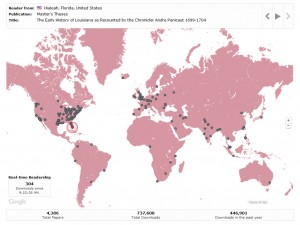We all know Loyola does amazing work with social justice and justice sustainability, but you may not know how eCommons, Loyola’s institutional repository contributes to that mission. eCommons contains scholarly items produced by Loyola faculty and students, and almost everything in there is free to anyone in the world to read. Since this week is Open Access Week, we wanted to share some facts you might not have known about eCommons.
eCommons has a global reach
At last count, eCommons had visitors from 179 countries, with every continent except Antarctica represented (and we are sure that will happen someday). Here’s the global traffic on a typical day in the middle of the semester. Most of our visitors from North America and Europe, but we also get lots of visitors from Asia and Australia.
 Our most engaged users come from countries you might not expect. A recent analysis of countries who were using eCommons the most heavily showed that users who were using a lot of material came from the following countries (in order by number of pages per visit):
Our most engaged users come from countries you might not expect. A recent analysis of countries who were using eCommons the most heavily showed that users who were using a lot of material came from the following countries (in order by number of pages per visit):
| Latvia |
| Ukraine |
| Myanmar (Burma) |
| Ecuador |
| Nicaragua |
| Laos |
| Bahrain |
| Dominican Republic |
| Rwanda |
| Mauritius |
eCommons is sustainable
eCommons helped Loyola achieve its ranking as the fourth greenest university in the nation? The Sierra Club and the Association for the Advancement of Sustainability in Higher Education recognize that open access to research stimulates learning and innovation, facilitating the translation of knowledge into environmental solutions.
Your one-stop shop for social justice scholarship at Loyola
The Social Justice collection in eCommons is curated by the Provost Office for Social Justice Initiatives. It highlights all the types of social justice research that happens at Loyola, from the law school to social work.
Items in eCommons get used… a lot
We have about 4,300 items in eCommons so far, and about 730,000 downloads. Some articles go viral, however–our most popular article in eCommons has almost 20,000 downloads! Our top ten downloaded items include theses and dissertations from the 1930s and 40s, some recent dissertations, and a research report on the Cook County Jail.

